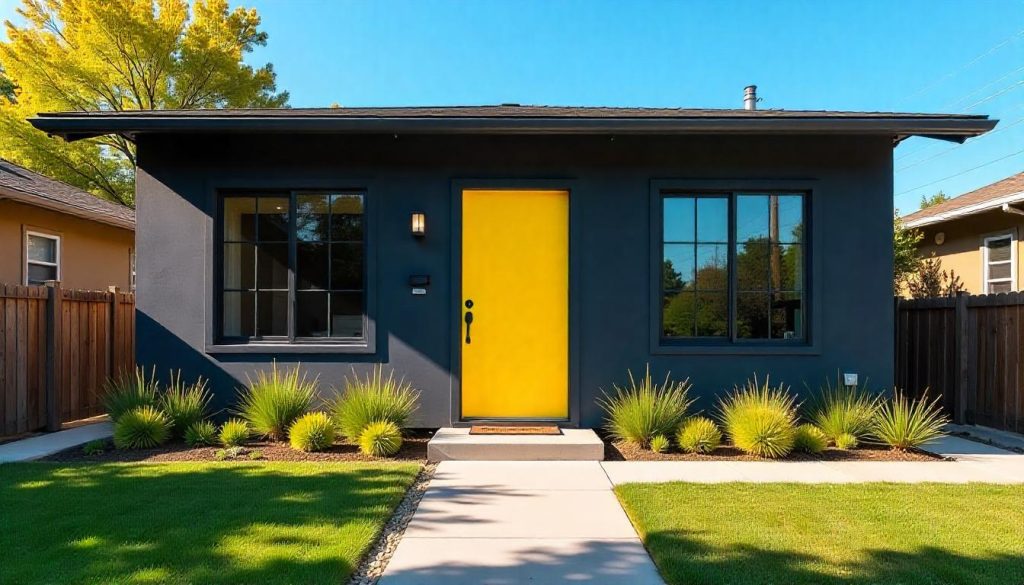Choosing a front door color isn’t just about aesthetics—it’s a chance to express your personality, boost curb appeal, and even affect the resale value of your home.

Whether you’re going bold, classic, or understated, the right color can transform your home’s entire vibe.
Contents
- Why Front Door Color Matters
- Popular Front Door Colors and What They Say About You
- Choosing the Right Color for Your Home’s Style
- Tips for Choosing the Best Front Door Color
- Trending Front Door Color Ideas for 2025
- Colors to Avoid (And Why)
- Should You Repaint or Replace Your Door?
- How to Test Colors Before Painting
- Final Thoughts
Why Front Door Color Matters
First Impressions Count
Your front door is one of the first things people notice. It sets the tone for your home’s character.
It Impacts Curb Appeal and Value
Real estate studies show that certain front door colors can increase a home’s perceived value and buyer interest.
It Reflects Your Style
Color communicates mood. Whether you’re going for welcoming, dramatic, or sophisticated, your front door is your canvas.
Popular Front Door Colors and What They Say About You
Classic Black
- Mood: Elegant, timeless, bold
- Best For: Modern, traditional, or colonial homes
- Pair With: White, grey, brick, or stone exteriors
- Why Choose It: Black doors look sleek and work in almost any setting. They also hide dirt well.
Bold Red
- Mood: Energetic, confident, welcoming
- Best For: Farmhouses, craftsman, or traditional homes
- Pair With: White, cream, blue, or grey exteriors
- Why Choose It: Red is a classic choice that grabs attention without being too trendy.
Cheerful Yellow
- Mood: Warm, sunny, inviting
- Best For: Cottage, bungalow, or coastal homes
- Pair With: Grey, blue, or white exteriors
- Why Choose It: Perfect for brightening up shaded entryways or small porches.
- Mood: Calm, trustworthy, classic
- Best For: Colonial, coastal, or modern homes
- Pair With: White trim, stone, grey, or light siding
- Why Choose It: A safer alternative to black that still feels stylish and composed.
Forest Green or Sage
- Mood: Natural, soothing, organic
- Best For: Craftsman, cottage, or homes surrounded by greenery
- Pair With: Earth tones, white trim, or stone
- Why Choose It: Ideal for blending in with nature or a garden-filled entry.
Bright Blue or Teal
- Mood: Fun, friendly, fresh
- Best For: Mid-century, beach house, or modern styles
- Pair With: Light-colored siding, white, or coral accents
- Why Choose It: A playful yet sophisticated color that stands out.
Warm Orange or Terracotta
- Mood: Energetic, earthy, eclectic
- Best For: Mediterranean, adobe, or rustic homes
- Pair With: Earth-toned stucco, brick, or creamy trim
- Why Choose It: Unconventional and artistic while still feeling warm.
Clean White
- Mood: Pure, classic, fresh
- Best For: Traditional, colonial, or minimalist homes
- Pair With: Any siding color, especially dark tones
- Why Choose It: White offers contrast and cleanliness—though it may require more upkeep.
Choosing the Right Color for Your Home’s Style
Colonial or Traditional
Best picks: Black, navy, red, or forest green
Why: These colors complement symmetrical architecture and formal landscaping.
Modern or Contemporary
Best picks: Black, grey, deep blue, or bold colors like orange
Why: Sleek lines and minimalism pair well with bold contrast or monochromatic palettes.
Cottage or Farmhouse
Best picks: Sage green, pastel blue, buttery yellow, or muted pink
Why: These colors add charm without overwhelming the cozy feel.
Coastal or Beach Style
Best picks: Aqua, teal, coral, or light gray
Why: Reflects a light, breezy, laid-back aesthetic.
Rustic or Craftsman
Best picks: Earthy red, olive green, bronze, or natural wood stain
Why: Complements wood, stone, and earthy materials.
Tips for Choosing the Best Front Door Color
Consider Your Siding and Trim Colors
Your door should contrast with your siding but coordinate with the overall color scheme. If your siding is dark, go for a lighter door and vice versa.
Think About Lighting
Sunlight affects how paint appears. Test samples at different times of day before committing.
Don’t Forget the Finish
- Glossy: Bold and reflective, easy to clean
- Semi-gloss: Most common for exterior doors—durable with a bit of shine
- Matte/Satin: More muted, best for historic or understated looks
Match or Contrast With Shutters
Decide if you want the door to blend with or stand out from shutters and trim. Both options can work depending on your design goals.
Trending Front Door Color Ideas for 2025
- Charcoal grey with brass hardware
- Dusty lavender for subtle charm
- Deep plum or eggplant for moody sophistication
- Burnt orange or ochre for a warm welcome
- Mint green for cottagecore and retro vibes
Colors to Avoid (And Why)
Neon Shades
They can look out of place unless you’re going for an extremely bold or art-centric vibe.
Very Pale Colors
They may get dirty fast and can appear washed out from the street.
Matching Your Siding Exactly
This creates a flat, lifeless look with no focal point.
Should You Repaint or Replace Your Door?
If your door is in good condition but looks dated or dull, a fresh coat of paint is all you need. If it’s damaged, warped, or letting in drafts, replacing it might be the smarter option.
How to Test Colors Before Painting
- Paint large swatches on poster board and tape them to your door
- Observe at different times of day (morning, noon, dusk)
- Consider the front yard, porch, and mailbox color too
Final Thoughts
Choosing the right front door color is part science, part art. It’s about harmonizing with your home’s architecture while also expressing your unique personality. Whether you lean classic or colorful, a well-painted door can completely refresh your exterior and leave a lasting impression.
